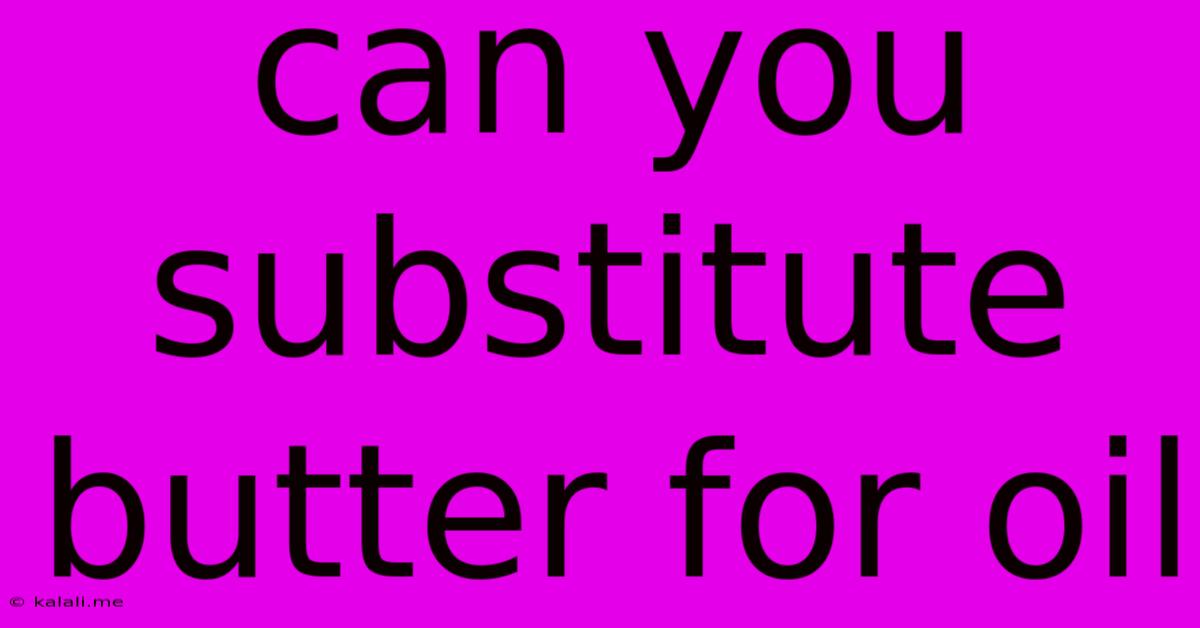Can You Substitute Butter For Oil
Kalali
May 23, 2025 · 3 min read

Table of Contents
Can You Substitute Butter for Oil? A Comprehensive Guide
Butter and oil are both common cooking staples, but they're far from interchangeable. While you can sometimes swap one for the other, understanding their differences is crucial for successful baking and cooking. This guide delves into the nuances of butter versus oil substitution, helping you make informed decisions in the kitchen.
Understanding the Differences: Butter vs. Oil
The key differences lie in their composition and behavior when heated. Butter, a dairy product, contains water and milk solids in addition to fat. These components impact its melting point and browning capabilities. Oil, on the other hand, is pure fat, usually derived from plants or animals. This lack of water and milk solids makes it more heat-stable and suitable for higher temperatures.
Substituting Butter for Oil: Baking
Substituting butter for oil in baking recipes often leads to undesirable results. The water content in butter can alter the texture of baked goods, leading to:
- Denser Cakes and Cookies: The water in butter can inhibit the leavening process, resulting in denser, less airy baked goods.
- Dryer Cakes and Cookies: The milk solids in butter can sometimes lead to a drier final product.
- Changes in Flavor and Texture: The distinct flavor of butter will also change the overall taste profile of the recipe. This might be desirable, but it's important to be aware of it.
When might a substitution work in baking? Small substitutions (up to 25%) might be manageable, especially in recipes that are already fairly dense, or where the butter's flavor is a key component. However, it's best to experiment cautiously, starting with a small batch.
Substituting Oil for Butter: Baking
Substituting oil for butter in baking is generally easier than the reverse, but it will still change the final product. You'll typically get:
- Moist Cakes and Cookies: Oil adds moisture, contributing to a softer, more tender texture.
- Less Rich Flavor: The distinct buttery flavor will be lost.
- Changes in Texture: The crumb structure might be slightly different. Cookies might be chewier.
Substituting Butter for Oil: Cooking
Substituting butter for oil in cooking is dependent on the cooking method and desired outcome. For sauteing or pan-frying, butter adds a rich flavor, but its low smoke point (around 302°F or 150°C) means it burns easily at high temperatures. Therefore, using a blend of butter and oil is frequently preferred to take advantage of both flavors and higher smoke points.
For high-heat cooking methods, like deep-frying, butter is unsuitable due to its low smoke point. This can produce acrid smoke and potentially harmful compounds. Oil with a high smoke point (such as canola, avocado, or peanut oil) is necessary.
Tips for Successful Substitutions
- Consider the recipe: The success of any substitution depends heavily on the specific recipe and its ingredients.
- Start small: When experimenting, always start with a small batch to test the results.
- Adjust accordingly: You may need to adjust other ingredients (like liquid or leavening agents) to compensate for the differences in fat content and moisture.
- Read reviews: Search online for experiences of others who have made the same substitution.
In conclusion, while butter and oil can sometimes be substituted for each other, it's not always a straightforward swap. Understanding their properties and carefully considering the impact on the final result is key to achieving success in your culinary endeavors. For best results, stick to the original recipe whenever possible, and only attempt substitutions with caution and careful consideration.
Latest Posts
Latest Posts
-
Where Would User Credentials Be Stored In Ros Linux
May 23, 2025
-
How To Know How Many Zeroes A Trig Function Has
May 23, 2025
-
Whats It Called To Have Four Arms
May 23, 2025
-
Ceiling Fan Light And Fan Not Working
May 23, 2025
-
Dnd 5e Medium Armore Spell Casting
May 23, 2025
Related Post
Thank you for visiting our website which covers about Can You Substitute Butter For Oil . We hope the information provided has been useful to you. Feel free to contact us if you have any questions or need further assistance. See you next time and don't miss to bookmark.